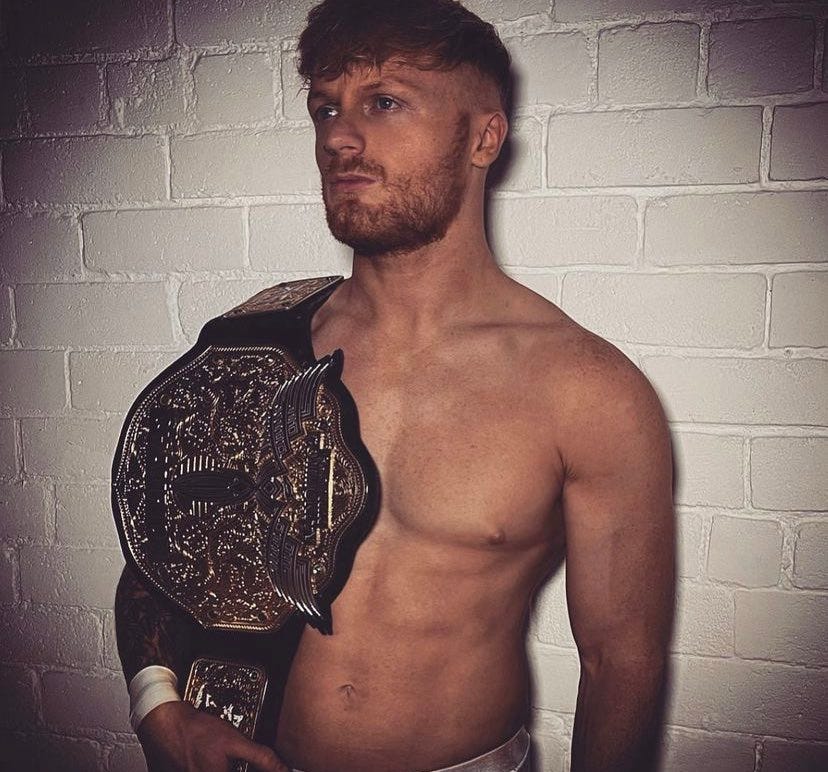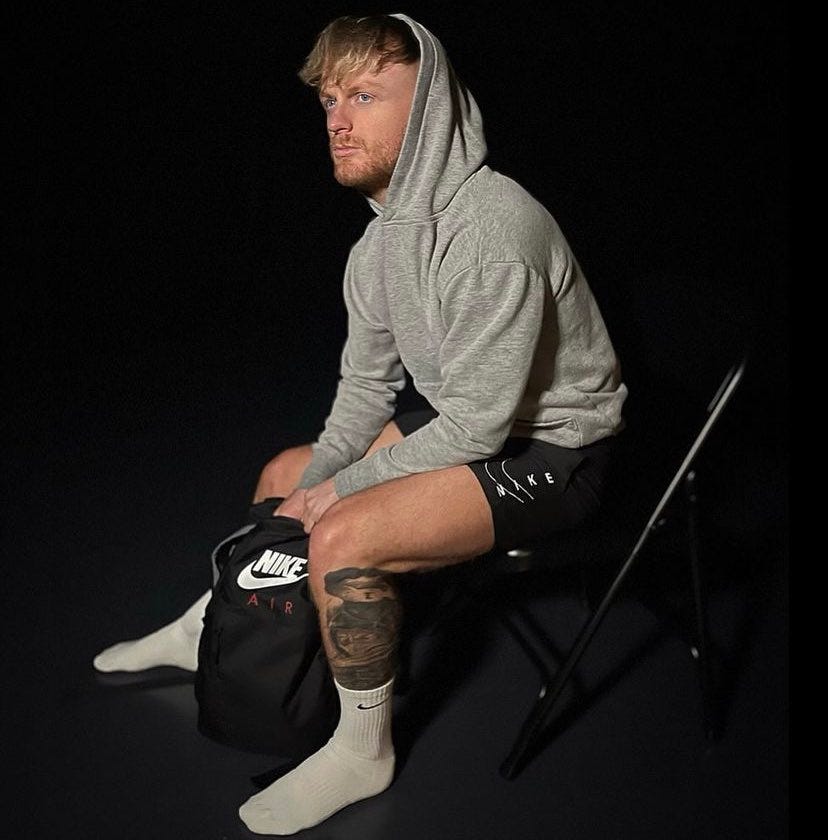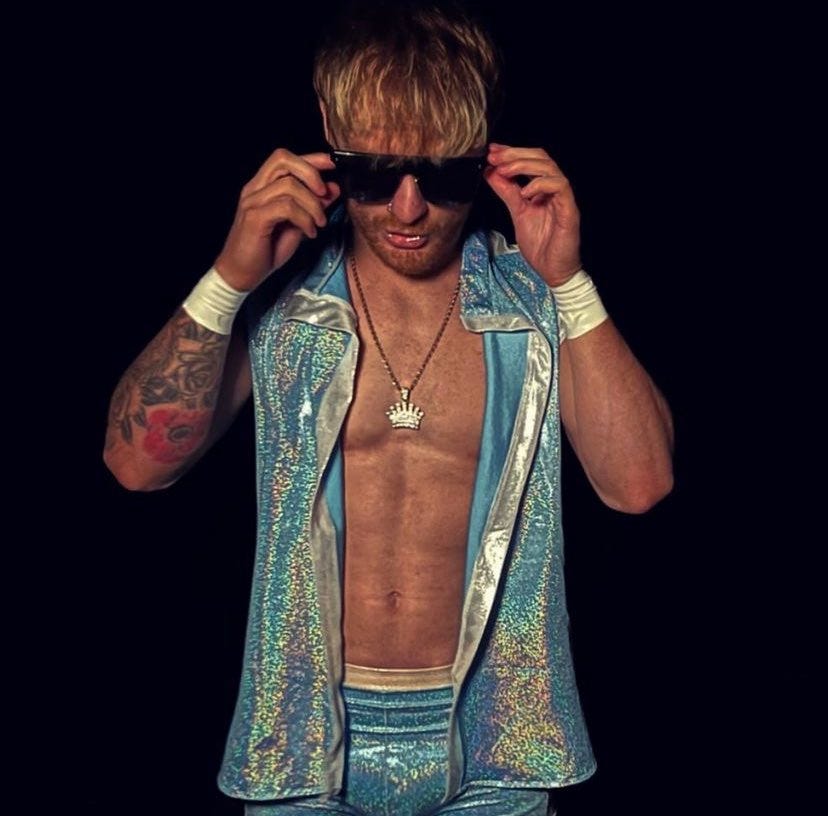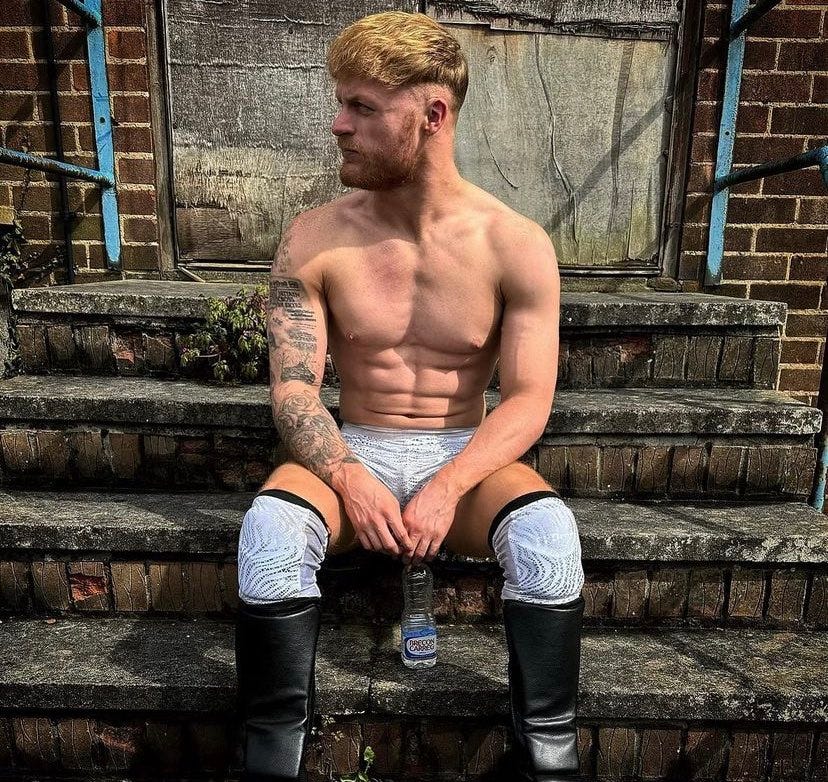‘Being authentic made me the wrestler I am’ – Adam Bolt on blazing a trail on the British wrestling scene.
Lockdown was a game-changer for this rising UK star. Now, Bolt is preparing to take the world by storm – and to try and help others along the way.
Adam Bolt is ready to strike.
Perched on the top turnbuckle, his dazed opponent within range, the Doncaster native takes a breath, and prepares to deliver the final blow.
Launching himself through the air, his chiselled body already rotating, Bolt grabs his opponent by the neck mid-flight and, still spinning, drives his shoulder into the jaw of his victim. Stunned, they rock back, dropping to the mat like they’ve been hit by a truck as a sold-out crowd gasps.
Bolt hooks a leg, and it’s all over. If we’re honest, it was all over from the moment he connected, and as the referee’s hand hits the mat for three, Bolt is already thinking of the next thing.
His music. His sunglasses. The autographs, the attention, the adulation.
Adam Bolt deserves it all, because this is just what he does.
He makes it look so easy.
He makes it look so good.
That’s Adam Bolt – one of the brashest, ballsiest, best young stars on the red-hot British wrestling scene.
But this story is about the evolution of the man behind the persona.
So, let us introduce you to Adam Johnson, and a lad who has loved wrestling since the moment he first set eyes on it, sat with his dad as a two-year-old, getting a glimpse of the larger-than-life stars of what was then known as the World Wrestling Federation.
‘Some kids had Peppa Pig, I had pro wrestling’, Johnson laughs.
‘I was hooked and always wanted to do it, but fifteen years ago, Rey Mysterio was the only example of a little guy making it. The internet brought about more promotions, then NXT took off with Sami Zayn and PAC. They’re both big guys, but smaller on the scale of what you saw on TV, so it started changing my mind a bit. It made me think that I could make a go of it, because I saw people who were a similar size to me doing just that.’
At twenty-two-years-old, Johnson began his journey in the industry – but just as he was making his first, tentative steps in the world he’d always dreamed of, society shut down. COVID meant everyone – wrestler or not – was sat at home.
And for Johnson, that brought an unexpected moment of clarity.
‘I will die on the hill that lockdown was the best thing that happened to my wrestling career’, he says.
‘It gave so much time for reflection, and I wasn’t even being me. So, it was at that time that I came out to my wrestling family. I realised that I couldn’t put 100 percent into my character when I couldn’t put 100 percent into being myself. Like, how could I be the best Adam Bolt? I just couldn’t without sorting the personal side of things as well’.
Coming out was a big decision for Johnson to take, in an industry that hadn’t historically been known for an enlightened attitude to LGBTQ+ inclusion. For sure, there were trailblazers like Pat Patterson – a grappling legend who made his name in a series of classic encounters in territories in San Francisco and New York, and who is widely acknowledged as one of the greatest minds the industry has ever had. In the UK, too, progress was happening, with the likes of Brad Slayer and Mitchell Starr sharing their stories away from the ring at the same time as they made moves in it.
But stack those examples up against promoters that equated being LGBTQ+ with a chance to draw cheap boos from an audience, or promotions staging ‘gay weddings’ or ‘hot lesbian action’ to pop a television rating, and you can see why being his authentic self was still a gutsy place for Johnson to arrive at.
And yet, when he looked at it from all angles, he knew he had no other choice.
‘I know me better than anyone else, and I don’t make the best decisions when I’m in my own head. I knew that, if I wanted Adam Bolt to become somebody, I needed a clear head – and my judgement was always clouded.’
‘A lot of people who have never come out might roll their eyes, but I feel it’s true. It’s the little things, like when you’re travelling for hours to shows with people, worried about what you say, that they might think differently of me, things like that.’
‘Coming out changed that entirely. It was a big thing, but once I said it, I felt better and it didn’t change anything – but all that worry just went away, and I could focus on being myself.’
Johnson’s story hit home with many.
There were TV pieces, newspaper articles, profiles on websites across the world – and a sense that his honesty about his sexuality, expressed in a typically honest post on Twitter, had managed to strike a chord.
‘People were coming to me, and I was feeling validation from helping people’, Johnson remembers.
‘It wasn’t like I’d been through that much, but I was able to help people, and that just felt like a really good thing.’
The bookings kept coming as well. There was a debut in Britain’s TNT promotion, and then a widely-lauded match in which Johnson defeated fellow LGBTQ+ wrestler Mitchell Starr for the UK’s first-ever Pride Championship as part of a Pride card staged by the historic WAW promotion in Norwich.
‘Something that night hit me’, Johnson admits.
‘I think it’s the most rewarding feeling I’ve felt in wrestling, as it tied the personal and professional sides of me together. People were applauding me, not just because I’m a champion but because of who I am.’
‘It doesn’t get better than that.’
It’s not just his sexuality that Johnson has opened up about.
In recent months, he’s posted movingly on social media about his own experience of living with body dysmorphia – a condition where a person spends a lot of time worrying about perceived flaws in their appearance that are often unnoticeable to others.
‘In school, I was always the small kid, so no matter what results I got going to the gym as an adult, I’d always look in the mirror and see skin and bones, every time. Every time! There would be people next to me who were slimmer than me, but I didn’t see that, and I still struggle with it. No matter how good I may have looked or how in shape I was, I would constantly compare myself to others. It’s taken me a while to get to a better place, but it doesn’t go away. It’s just about learning to cope with it and deal with it.’
By pulling back the curtain and revealing more about his personal journey, Johnson joins a growing number of grapplers who are willing to break character in order to help others.
But make no mistake about it, he still has huge plans for Adam Bolt - his designer-wearing, arrogant alter-ego who revels in making everything around him look good.
There are hints of a journey to compete in the United States – perhaps as part of the iconic Big Gay Brunch franchise masterminded by fellow out wrestler EFFY – along with a desire to make his name in some of the bigger British promotions.
Johnson’s goal of stepping into the ring with British stand-out Lizzy Evo is still at the forefront of his mind, and as to whether 2024 could be even bigger for the Doncaster-based wrestler than 2023?
Well, let’s just say that Johnson is being coy.
‘There was a reason that it was crunch-time this year, that I had to be in the best shape of my life’, he hints cryptically.
‘I need to be the healthiest I’ve ever been – emotionally, physically, mentally, I just had to be!’
And if Adam Bolt is preparing to try and scale new heights in the business, Adam Johnson is determined that he won’t forget his roots.
‘I can relate to people who have been where I am’, he says reflectively.
‘If you can help somebody along the way, then why not?’ As a wrestler, I have a platform. It’s not the smallest, it’s not the biggest, but there will be somebody who can reach out and want help because they follow me.’
‘And honestly, it’s the least I can do.’
British wrestling star Adam Bolt was speaking to Jack Murley on The Jack Murley Sports Show. The full episode is available on Wednesday 1st May at 0800 UK Time. You can hear new episodes on Apple Podcasts, Spotify and all other podcast platforms.







